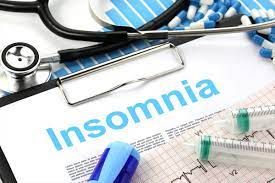Insomnia Guide
Insomnia Guide
What is Insomnia?
Insomnia is when a patient has serious issues falling asleep or waking up frequently throughout the night. Insomnia refers to many sleep issues and can  be diagnosed when the patient:
be diagnosed when the patient:
Has Trouble Getting to Sleep
Is Restlessness During Sleep
Sleeps for a Short Time and Wakes Up Unable to Fall Asleep Again
Wakes Up Before One is Rested
Is Fatigued Even After Rest
Kinds of Insomnia
There are two main categories of Insomnia based on the root source of the condition: Primary Insomnia and Secondary Insomnia.
What is Primary Insomnia?
Primary Insomnia refers to sleep issues not caused by other health issues the patient experiences.
What is Secondary Insomnia?
Secondary Insomnia refers to sleep issues that are related to other aspects of a patient's health state or lifestyle. There are several subcategories here:
Emotional issues such as depression and anxiety can lead to Insomnia
Health problems such as heartburn, cancer, or arthritis can lead to Insomnia
Lifestyle issues such as drinking or shift work can lead to Insomnia
Chronic and Acute Insomnia
Insomnia is also categorized by frequency and duration. Chronic Insomnia refers to Insomnia that has been an issue in the patient's life for an extended period of time, whereas Acute Insomnia refers to temporary yet still significant sleep disruption. Some patients deal with Chronic Insomnia day after day, whereas others only experience the condition under certain circumstances.
From a medical perspective, Chronic Insomnia refers to sleep disruption which lasts for at least a month and manifests itself at least three times per week, whereas Acute Insomnia refers to Insomnia that only occurs a single time or over the course of less than a month.
What Causes Acute Insomnia?
Acute Insomnia is generally the result of factors and changes in one's life, including stress and environment. As such, usually Acute Insomnia can be treated by changing one's habits. The following are some factors that can lead to Acute Insomnia:
Disruption of Sleeping Habits resulting from Lifestyle Adjustments
Certain medications, including those for Asthma, Hypertension, Depression, Allergies, and Cold
Environmental disruptions, including uncomfortable heat or cold, light, or noise
Uncomfortable sleeping arrangements
Emotional distress
Illness
Significant stress, such as stress resulting from moving, divorce, mourning, or employment changes
What Causes Chronic Insomnia?
There are certain conditions in one's life that can lead to Chronic Insomnia, but in the case of Primary Insomnia, the root cause is physiological and  direct. Secondary causes of Chronic Insomnia include:
direct. Secondary causes of Chronic Insomnia include:
Discomfort or pain which makes it hard to fall asleep
Chronic stress prevents the body and mind from successfully falling asleep
Anxiety and depression make it difficult to prime the mind for restful sleep
What Are the Symptoms of Insomnia?
Sleep is incredibly important. Our bodies use the time we are asleep to rebuild and rejuvenate our bodies. Our brains also use sleep to form long-term memories and remember important information.
Hormone Balance is also predicated on healthy sleep, as Testosterone and Human Growth Hormone, along with other hormones, are primarily produced while we are asleep. The following are some of the most common symptoms of Insomnia:
Forgetfulness
Trouble Concentrating
General Exhaustion
Daytime Sleepiness, or a Tendency to Fall Asleep During the Day
How is Insomnia Diagnosed?
Unlike many other conditions, it's pretty easy to recognize when one is suffering from Insomnia, although patients that wake up exhausted may be less likely to seek assistance as quickly as those that experience frequent sleepless nights. If you believe you are experiencing Insomnia, make an appointment with a health professional.
You'll usually provide a medical history during your appointment, and your doctor will perform a physical to evaluate your condition. You'll also need to report the sleeping issues you've been experiencing, including the severity and duration of your issues.
Most doctors will request that you maintain a diary of your sleeping habits over the course of a couple of weeks, in which you write down when you remember falling asleep and waking up, as well as your energy levels during the day.
If you have a partner, your doctor may want to discuss your sleeping habits with them to learn more about them, including any snoring or restlessness that you may not experience consciously.
If your doctor suspects sleep apnea or another condition that inhibits sleep that can't be effectively diagnosed without actually monitoring your sleep, they may arrange for you to go to a sleep specialist.
How is Insomnia Treated?
How Insomnia is treated depends upon the severity and the duration of the Insomnia. For patients that experience short-term Acute Insomnia, no treatment may be needed at all, or the treatment may just be minor, perhaps even just a simple OTC Sleep Aid.
For patients with light Insomnia, the best form of treatment is often lifestyle adjustment—making the effort to engage in healthy and conscientious sleeping habits.
 For patients experiencing Chronic Insomnia impacting their ability to perform in their Day-to-Day life, your physician may provide you with one of many prescription medications designed to help you fall asleep easier.
For patients experiencing Chronic Insomnia impacting their ability to perform in their Day-to-Day life, your physician may provide you with one of many prescription medications designed to help you fall asleep easier.
Generally, these treatments are only prescribed short-term, as the goal is to restore a normalized sleeping pattern and then train the patient to sleep better on his or her own.
For Chronic Insomnia, the ideal prescription medication for most patients activates rapidly and helps the patient fall asleep quickly before wearing off, allowing the patient to sleep restfully throughout the rest of the night.
For these patients, OTC Sleep Aids aren't enough under most circumstances, and long-term use of these sleep aids can lead to side effects that can even exacerbate Insomnia in the long term.
Of course, one of the most critical aspects of Chronic Insomnia diagnosis and treatment is discovering whether the patient is suffering from Primary or Secondary Insomnia.
The physical and medical history will provide evidence of any underlying conditions preventing healthy sleep. Treating these conditions and helping the patient fall asleep more quickly in the meantime is often possible to help the patient overcome Insomnia completely.
Cognitive Behavioral Therapy is also highly effective for the treatment of Insomnia because there are specific patterns and behaviors which can exacerbate Insomnia or may even be the root cause of Chronic Insomnia. Some forms of therapy which have shown significant effectiveness are reconditioning, sleep restriction, and relaxation techniques.
How Can I Overcome Insomnia with Good Habits?
If you are having issues with Acute Insomnia and would like to try to fix the problem on your own before seeing a specialist, there are some innovative steps you can take to improve your sleep hygiene and improve your sleeping habits. Try incorporating these tips into your life and see what happens:
Don't smoke or use caffeine in the early afternoon or evening—These vices have the capacity to cause or exacerbate anxiety. Both nicotine and caffeine are stimulants, and if you use them late, it can make it really hard to go to sleep if you have a sleep sensitivity. Caffeine has a half-life of around 5 or 6 hours, so you should have your last cup of coffee at least six hours before bed, if not nine hours.
Don't drink in the evening—Alcohol can help you go to sleep, but the intoxicating effects will wear off while you are asleep, and this can cause you to wake up early and hungover.
Establish a stable sleeping pattern—For people with Insomnia, making the effort to create a normalized sleeping pattern can be highly beneficial. Your body prefers to run on an established 24-hour pattern, and deviating from that pattern can have consequences in the form of poor sleep and insomnia.
Avoid naps—Although some people function well with an afternoon nap, for people with Insomnia, a nap can lead to nighttime restlessness that prevents them from getting healthy sleep.
Exercise Regularly—Exercise stimulates your body and helps you establish set physiological patterns. If you don't get enough exercise, this can cause you to experience symptoms of Chronic Fatigue, which can leave you constantly tired but unable to sleep well. Of course, it's crucial to exercise at the
 right time. Exercise is a highly stimulative activity, so it's best for the morning or early afternoon when you would generally find yourself dragging. Daytime exercise can help you sleep better, but if you exercise in the 3-4 hours before bed, this can get you too stimulated to sleep.
right time. Exercise is a highly stimulative activity, so it's best for the morning or early afternoon when you would generally find yourself dragging. Daytime exercise can help you sleep better, but if you exercise in the 3-4 hours before bed, this can get you too stimulated to sleep.Don't eat too much just before bedtime—Many people mistake loading up on a big meal late in the evening before bed. Although it is true that a small, protein-based snack can provide health benefits while you sleep, a big meal weighs you down and puts a strain on your digestive system, which slows down when you fall asleep.
Create a comfortable and inviting sleep space—Often, people have trouble sleeping because they don't have their bedroom designed with a healthy night's sleep in mind. Excess light and sound can make it really hard to sleep. Also, be sure to turn your thermostat to a temperature that really puts you in a comfortable mood.
Establish patterns before bed to help you relax—Try to follow the same pattern every night, and your body will adopt the pattern and promote restfulness. Take a hot shower before taking a half hour to wind down with a book, for example.
Don't use your bed as an entertainment space—Too often, people have trouble getting to sleep because they watch television or play games on their laptops or cell phones in bed. Anything that stimulates you in bed (besides sex) is counterproductive.
Don't Stay in Bed When You Can't Sleep—If you find yourself dwelling on the fact that you can't sleep, get out of bed and do something else. It can make falling asleep harder if you don't get out of bed. Spend thirty minutes or so doing something like reading or organizing that doesn't get you too active.
Keep a To-Do List—For people that have trouble sleeping because of anxiety and worry, it can be helpful to write down a list of things you need to do shortly. Create a timeline or a grocery list. Write a list of your worries. Once you get your worries down on paper, push them out of your mind until the following day.
- Xylitol is a Natural, Plant-Sourced and Low-Calorie Sweetener [Last Updated On: January 8th, 2025] [Originally Added On: January 12th, 2021]
- The Secret Behind Keeping the Weight Off for Good -- No More Losing and Gaining Cycles! [Last Updated On: January 17th, 2025] [Originally Added On: January 13th, 2021]
- The Cognitive Benefits of Starting a CoQ10 (Coenzyme Q10) Supplement Regimen [Last Updated On: January 12th, 2025] [Originally Added On: January 14th, 2021]
- It's Time to Understand Why Vitamin C is Critical for Our Health and Longevity! [Last Updated On: January 10th, 2025] [Originally Added On: January 15th, 2021]
- Snoring is the Most Common Early Symptom of Sleep Apnea -- Do You Suffer From It? [Last Updated On: January 11th, 2025] [Originally Added On: January 16th, 2021]
- Vitamin-d Longevity Vitamin [Last Updated On: January 2nd, 2025] [Originally Added On: January 17th, 2021]
- Twenty Simple Weight Loss Tips That Can Change Your Life [Last Updated On: January 1st, 2025] [Originally Added On: January 18th, 2021]
- Twelve Ways To Control Cravings [Last Updated On: February 22nd, 2025] [Originally Added On: January 19th, 2021]
- The Truth About The Zone Diet [Last Updated On: January 1st, 2025] [Originally Added On: January 20th, 2021]
- The Truth About The Schwarzbein Principle [Last Updated On: December 31st, 2024] [Originally Added On: January 21st, 2021]
- The Truth About The Realage Diet [Last Updated On: December 31st, 2024] [Originally Added On: January 22nd, 2021]
- The Truth About The Origin Diet [Last Updated On: December 30th, 2024] [Originally Added On: January 23rd, 2021]
- The Truth About The Eat Right, Live Longer Diet -- Nourishing Food Equals Increased Longevity [Last Updated On: January 31st, 2025] [Originally Added On: January 24th, 2021]
- The Essential Roles Magnesium Plays For Our Energy Levels, Skin Youthfulness and Mental Health [Last Updated On: January 4th, 2025] [Originally Added On: January 25th, 2021]
- The Real Skinny On Vitamin B12. What It Can And Cannot Do For You [Last Updated On: March 23rd, 2025] [Originally Added On: January 26th, 2021]
- The Importance And Purpose Of Stress [Last Updated On: February 18th, 2025] [Originally Added On: January 27th, 2021]
- The Ideal Balanced Diet The Reality Of Healthy Eating [Last Updated On: December 30th, 2024] [Originally Added On: January 28th, 2021]
- The Effects Of Cortisol On The Body [Last Updated On: July 28th, 2024] [Originally Added On: January 29th, 2021]
- Sixteen Common Foods That Increase The Cancer Risk [Last Updated On: December 29th, 2024] [Originally Added On: January 30th, 2021]
- Should You Consider Intermittent Fasting? [Last Updated On: November 24th, 2024] [Originally Added On: January 31st, 2021]
- Can Caloric Restriction Help You Lose Weight And Live Longer? [Last Updated On: November 24th, 2024] [Originally Added On: February 1st, 2021]
- How Does Poor Sleep Rob Vitality And Health? [Last Updated On: November 24th, 2024] [Originally Added On: February 2nd, 2021]
- Nine More Natural Ways To Relieve Anxiety [Last Updated On: November 24th, 2024] [Originally Added On: February 3rd, 2021]
- Metabolism Boosting Tips For Losing Weight And Feeling Great [Last Updated On: November 22nd, 2024] [Originally Added On: February 4th, 2021]
- Juicing Pros And Cons [Last Updated On: March 22nd, 2025] [Originally Added On: February 5th, 2021]
- How To Lose Weight With Human Growth Hormone [Last Updated On: November 20th, 2024] [Originally Added On: February 7th, 2021]
- How Safe Is Monosodium Glutamate AKA Msg? [Last Updated On: November 23rd, 2024] [Originally Added On: February 8th, 2021]
- How Is Sleep Apnea Diagnosed And Treated [Last Updated On: November 18th, 2024] [Originally Added On: February 9th, 2021]
- Hidden Sources Of Sugar In Common Foods [Last Updated On: November 17th, 2024] [Originally Added On: February 10th, 2021]
- How Would You Like to Potentially Add 14 Healthy and Youthful Years to Your Life Span? [Last Updated On: November 19th, 2024] [Originally Added On: February 11th, 2021]
- Four Reasons Why Healthy Sleep Encourages Weight Loss [Last Updated On: November 16th, 2024] [Originally Added On: February 12th, 2021]
- Omega-3 Fatty Acid Facts And How They Relate To Hormone Replacement Therapy [Last Updated On: July 25th, 2024] [Originally Added On: February 14th, 2021]
- Drink Right To Live Well [Last Updated On: November 15th, 2024] [Originally Added On: February 15th, 2021]
- Consumers Of Processed Meat Put Themselves At Risk [Last Updated On: November 14th, 2024] [Originally Added On: February 16th, 2021]
- Comparing The Same Mass Of Muscle And Fat [Last Updated On: February 19th, 2025] [Originally Added On: February 17th, 2021]
- Watermelon Health Food? The Benefits Of L-citrulline And Watermelon [Last Updated On: November 13th, 2024] [Originally Added On: February 18th, 2021]
- Alcohol Appears To Impact Sperm Quality [Last Updated On: November 12th, 2024] [Originally Added On: February 19th, 2021]
- The Benefits of Selenium - Should You Take a Selenium Supplement? [Last Updated On: February 9th, 2025] [Originally Added On: April 8th, 2021]
- Selenium and its Impact on Your Health and Hormones [Last Updated On: March 3rd, 2025] [Originally Added On: April 8th, 2021]
- Scientifically Proven Benefits Of Turmeric The Indian Spice [Last Updated On: March 18th, 2025] [Originally Added On: April 27th, 2021]
- Natural Remedies for Heartburn or Acid Reflux [Last Updated On: February 18th, 2025] [Originally Added On: May 22nd, 2021]
- What the Heck Is a Raisin, Anyway and Why Would I Want to Eat One? [Last Updated On: August 18th, 2024] [Originally Added On: June 10th, 2021]
- Fat-Focused Diet May Help Boost Testosterone [Last Updated On: February 17th, 2025] [Originally Added On: June 10th, 2021]
- Chia Seeds: More Than Just a Fad [Last Updated On: July 12th, 2024] [Originally Added On: June 24th, 2021]
- Intermittent Fasting Boosts Growth Hormone, and Improves Cognitive Health [Last Updated On: March 4th, 2025] [Originally Added On: May 2nd, 2022]
- Growth Hormone, Nutrition, and Diet Affect Longevity [Last Updated On: February 14th, 2025] [Originally Added On: May 6th, 2022]
- How Your Health is Affected by Brown and White Fat [Last Updated On: February 14th, 2025] [Originally Added On: May 17th, 2022]
- Tesamorelin Boosts HGH Levels and Burns Belly Fat [Last Updated On: February 14th, 2025] [Originally Added On: May 21st, 2022]
- Build Muscle With Tofu - Don't Fear Soy [Last Updated On: December 29th, 2024] [Originally Added On: July 12th, 2022]
- Balancing HGH Levels with Weekly Sogroya [Last Updated On: December 28th, 2024] [Originally Added On: September 1st, 2022]
- Pecans Are Amazing [Last Updated On: February 19th, 2025] [Originally Added On: November 22nd, 2022]
- The Benefits of Fenugreek [Last Updated On: October 14th, 2024] [Originally Added On: November 24th, 2022]
- The Foods To Eat To Increase Stem Cells [Last Updated On: March 6th, 2025] [Originally Added On: December 7th, 2022]
- The Versatility of Pecans [Last Updated On: February 19th, 2025] [Originally Added On: February 9th, 2025]
- Understanding The Concept: A Pound Of Muscle Vs. A Pound Of Fat [Last Updated On: February 19th, 2025] [Originally Added On: February 11th, 2025]
- The Aging Enigma: Unravelling the Web of Human Growth Hormone Decline [Last Updated On: February 17th, 2025] [Originally Added On: February 12th, 2025]
- Rekindling the Flame: How a Fat-Friendly Diet Can Ignite Testosterone Levels [Last Updated On: February 14th, 2025] [Originally Added On: February 13th, 2025]
- Unlocking Your Inner Fountain of Youth: The Magic Elixir of HGH Injections for Women [Last Updated On: February 17th, 2025] [Originally Added On: February 14th, 2025]
- Effective Strategies for Controlling Cravings [Last Updated On: February 17th, 2025] [Originally Added On: February 17th, 2025]
- Overview of Hormone Replacement Therapy and the Role of Intermittent Fasting [Last Updated On: February 22nd, 2025] [Originally Added On: February 22nd, 2025]
- Understanding the Power of Stem Cells [Last Updated On: February 24th, 2025] [Originally Added On: February 24th, 2025]
- The Role of Selenium in Health and Hormones [Last Updated On: February 26th, 2025] [Originally Added On: February 26th, 2025]
Word Count: 1722







